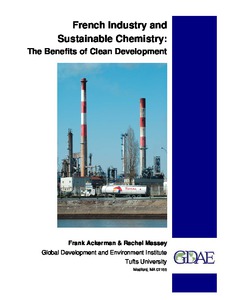French industry and sustainable chemistry : the benefits of clean development
"The French economy is one of the five largest in the world, with a gross domestic product (GDP) of €26,500 per person. French workers are remarkably productive, with output per hour of labor higher than in the US, Japan, and almost all EU nations. Thus it is not surprising that French citizens...
| Main Authors: | , |
|---|---|
| Institution: | ETUI-European Trade Union Institute |
| Format: | TEXT |
| Language: | English |
| Published: |
Medford, MA
2005
Tufts University. Global Development and Environment Institute |
| Subjects: | |
| Online Access: | https://www.labourline.org/KENTIKA-19138625124919568079-French-industry-and-sustainabl.htm |
| Summary: | "The French economy is one of the five largest in the world, with a gross domestic product (GDP) of €26,500 per person. French workers are remarkably productive, with output per hour of labor higher than in the US, Japan, and almost all EU nations. Thus it is not surprising that French citizens enjoy a high standard of living and extensive social Over the long run, French economic performance has been similar to that of other leading industrial economies: rapid growth in the decades following World War II, giving way to restructuring and then slower growth from the 1980s onward. Restructuring quickly led to success in foreign trade; French exports have exceeded The costs of environmental protection are quite often overestimated in advance, and do not threaten the French economy. Recent European experience in international trade shows that environmental protection does not harm industry or undermine competitiveness. In recent years, the worlds leading exporter has been Germany. If European wages and regulations made a country uncompetitive, as pessimistic observers sometimes suggest, then neither Germany nor France would be thriving in world markets. Yet in fact, both countries are very successful exporters. The chemical industry had worldwide sales of €1.8 trillion ($2.2 trillion), more than 5% of world GDP, in 2004. Despite growing production in some developing countries, the majority of global chemicals production occurs in the EU, US, and Japan; these countries, especially the EU, routinely have trade surpluses in chemicals with the rest of the world. France produced 5.3% of the worlds chemicals in both 1980 and 2004, confirming that the country is holding its own in a changing, competitive global market. Pharmaceuticals are now the fastest] growing branch of the chemical industry in France and in many other countries. In 2004, pharmaceuticals accounted for 41% of the turnover of the French chemical industry; other specialty chemicals such as perfumes and cosmetics, paints, soaps and cleaning products, and agricultural chemicals accounted for 31%; and basic chemicals and plastics made up the remaining 28%. ..."
(From the Executive Summary) |
|---|---|
| Physical Description: | 56 p. Digital |

